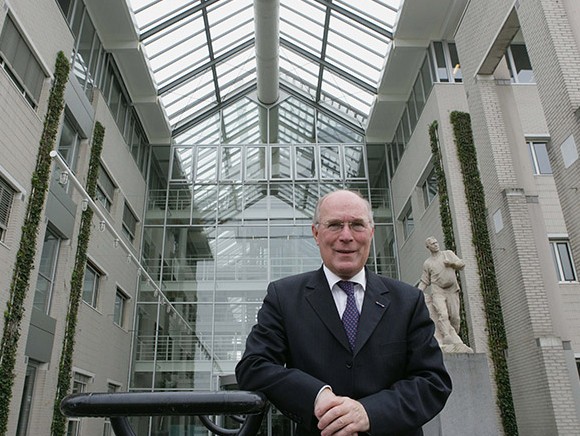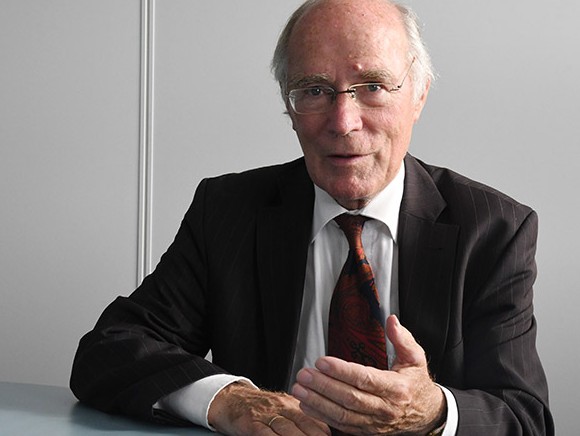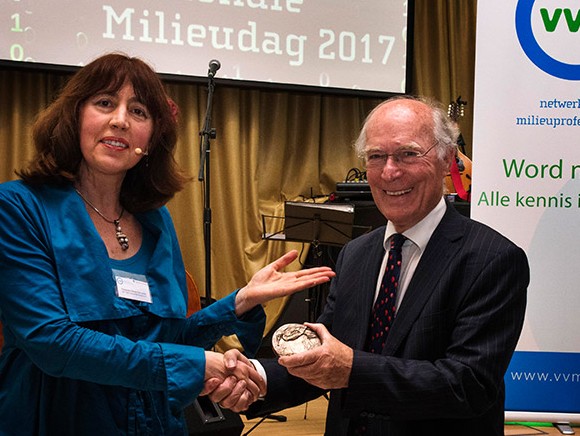
Earlier this year Prof. Dr. Ir. Rudy Rabbinge won the Rachel Carson prize, which is awarded once every five years by VVM, a Dutch network of environmental professionals. From 2001 to 2011, Rudy Rabbinge was a professor at Wageningen University with a focus on sustainable development and food security.
The judging panel described him as the global founder of the production ecology and suggested that his social vision and academic work have had a huge impact for people and the environment. Production ecology explores ways to improve the yield per hectare while also limiting the use of things like crop protection agents and artificial fertilisers. “Rabbinge’s vision of agriculture could not only be the key to feeding all the mouths on the planet, but also to providing them with a nutritious diet,” stated the panel.
“The key task for the agrifood industry is to ensure that the right kind of agriculture is in the right place. A much higher level of production is possible at global level, and we can also further reduce the environmental impact per unit produced. To do so, the agrifood sector must concentrate as much as possible on land that is suitable for agricultural purposes – i.e. fertile land. Less suitable land produces lower yields and requires more intervention; crops in more marginal soils require more additives, for example. The goal should be to continuously reduce the use of crop agents, including through breeding to improve crop resistances and through organic methods. The soil is not yet being used smartly enough. One example is the ‘urban sprawl’ – the huge built-up area that extends along the east coast of the USA. That’s a terrible waste of fertile land. Generally speaking, the Netherlands takes a more considered approach to using land wisely, and things are traditionally better organised thanks to the regional water authorities – some of which have been around for as long as 600 years.”
“Yes, people can still keep eating meat, despite the fact that demand is rising due to increasing prosperity. The same applies to livestock farming as to arable farming; you should utilise the right land. We don’t need to stop eating meat from a food security perspective. However, for health reasons I would advise against the very meat-heavy American diet. The Mediterranean/Italian diet is much better from a health viewpoint: a lot of variety, not too much meat, occasionally fish instead or meals without any animal protein. Other important components in that type of diet are olive oil and garlic. In fact, the Italians seem to regard garlic consumption as a basic human right!”
“Some time ago I developed a value ladder called the ‘12 Fs’, ranking the highest-value crops down to the lowest-value ones. Flowers are at the very top, followed by farma, flavour, fragrance, function molecules, fermentation products, vegetables, fruits, food, fodder, fibre and right at the bottom is fuel – so biofuels are the worst choice, and flower production generates the most value. To produce a year’s supply of flowers for one person you need just four square metres. To produce enough fuel for one car for a year you need two hectares, and on top of that plants can be used more beneficially than fuel can.”

Rudy Rabbinge (1946) obtained a degree in plant diseases, and for his PhD he conducted research into organic methods to tackle spider mite (1976). He has been a senior lecturer and university professor and has held board-level positions at Wageningen UR, NWO and KNAW as well as within companies and the public sector. For the Dutch political party PvdA he was member of the Provincial Council of Gelderland (1978-1988), member of the Scientific Council for Government Policy (1988-1998) and member of the First Chamber of Dutch Parliament (1999-2007), was member of the board of directors of the Alliance for a Green Revolution in Africa (AGRA) and formed part of the High Level Panel of Experts of the UN Committee on World Food Security.
“The popularity of organic crops is based on dogmas rather than facts. The energy costs per unit of product are relatively high and, in reality, behind some of the natural agents used in organic production are substances that are actually just pesticides. However, organic crops do have an upside – people who buy them feel happier. But while organic may be better for your soul, it’s a threat to future food security.”
“The food industry has an important role to play, and more and more companies are actually shouldering that responsibility. Around 20 years ago Antony Burgmans, CEO of Unilever, enlisted my help to advise on the development of Unilever’s sustainability goals. A focus group was formed which also included the company’s harshest critics. Sustainable agriculture is a key element of those goals. At first the initiative was met by scepticism in the outside world and it was ‘tolerated’ internally, but it has now become accepted and appreciated. Unilever also took the lead in improving the sustainability of palm oil production, for example, via the RSPO, and it was one of the first companies to consider the interests of more stakeholders, of society as a whole in its policymaking. Other food companies have taken this important step since then, such as Nestlé and FrieslandCampina.”

“Agricultural production can – and must – be substantially improved in many parts of the world. It’s important to translate the results of academic research into practice. For example, I’m involved with IFDC which helps small farmers in the Global South to boost their productivity. They don’t yet have the same knowledge and expertise as Dutch farmers and growers. It might sound like a contradiction in terms, but development of a high-productivity agricultural sector in Africa is essential in order to preserve the tropical rainforest there. High-productivity agriculture ensures that more land remains available for other purposes and helps to protect biodiversity. In 2006 Kofi Anan asked me to help out within the Alliance for a Green Revolution in Africa (AGRA). We’ve made good progress there and things are now going well.”
Source: Portretfoto en foto VVM: ©Michiel Wijnbergh, Foto bij Wur: ©Vidiphoto